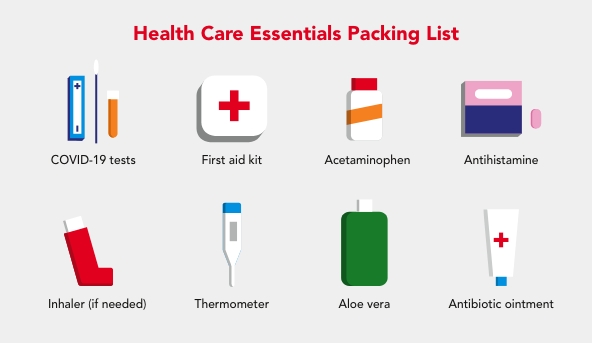
Published July 2022
For fun, relaxation and much-needed quality time with loved ones, there’s nothing better than a vacation. But even when you least expect it, health issues big and small can pop up in paradise.
Follow these tips to stay ready in the event of a medical issue or emergency while traveling:
Learn More >> Log into the Member Portal for Resources and Support
Get clear on coverage.
Depending on your health insurance provider and benefits, you and those on your plan may be covered outside of your home state in the event you become sick or injured. Before you depart for vacation, contact your health insurance provider to find out what your plan specifically covers and what it doesn’t while you’re away from home.
Know your care options.
While on vacation, you or a loved one could encounter anything from a sinus infection to a bone fracture. Keep in mind that depending on the severity of the health concern, there are a variety of options for getting the care you need.
While more severe injuries will require an emergency room visit, non-life-threatening injuries, health concerns or prescription needs that come up may be resolved virtually through a telehealth visit or in-person at a local urgent care center. In the event you need to make a telehealth appointment, be sure to have your health insurance provider’s telehealth app downloaded beforehand. Harvard Pilgrim members can download the Doctor On Demand app to their smartphone. Researching local health centers and hospitals near your destination can also come in handy when traveling.
Learn More >> Find a Provider
Pack essential information and items.
Before you leave, make sure you have easy access to any information, records or essential items you or a family member might need. This includes physical or digital copies of your health insurance information and member ID card. Some providers like Harvard Pilgrim make it easy to access your insurance card by adding it to your Apple Wallet or Google Pay. Additionally, have a list of any chronic illnesses, allergies and prescriptions on hand, plus the name and number of your PCP in the event a health care facility doesn’t have immediate access to your medical records. Remember to pack any prescriptions or medications you or others might need, and if you happen to be traveling abroad, be aware that each country has their own guidelines on what medications are allowed. You can contact the foreign embassy of the country you’re visiting to make sure your medications are permitted.

Look out for these common summer illnesses.
During the summer months, certain health conditions can catch us off guard. Here are some of the more common conditions you or a loved one could experience this summer, and how to prevent them:
- Summer colds. Take care of your immune system by getting plenty of rest, washing your hands regularly, eating nutrient-rich foods and avoiding anyone who might be sick.
- Plant rashes. Know how to identify poisonous plants like poison ivy and poison oak and wear protective clothing while spending time outdoors in green spaces. If you identify these plants in your own yard, remove and dispose of them carefully with gloves.
- Swimmer’s ear. Most often seen in children who spend excessive time engaging in water activities, swimmer’s ear is an infection in the outer ear canal. It can be prevented by wearing ear plugs and keeping your ears dry after being in the water. Remember to tip your head from side to side to drain excess water and to dry the outer ear with a towel.
- Asthma. Hot and humid weather can affect air quality, which may trigger an asthma flareup. Stay indoors in cool, air-conditioned air and stay hydrated; water helps to thin out mucus, clear the lungs and make it much easier to breathe.
- Food poisoning. Food spoils much quicker in the summer when temperatures are high, due to bacteria growing faster in the heat. Remember to keep raw meat, poultry and seafood in the fridge until ready to cook and to thoroughly clean produce before use.
In the event of a medical emergency or health issue while you’re on vacation, being prepared can make all the difference. Staying ready before you set off for your travels means that you act quickly and avoid any obstacles to receiving the care you need—ensuring the whole family has a healthy, fun vacation.
To confirm eligibility for any programs or services mentioned in this article as it relates to your specific health plan, please reach out to your account executive or HR benefits team. You may also speak to our member services team at (888)-333-4742 or by sending a secure email. And for plan details and other member resources, log in to the member portal.


